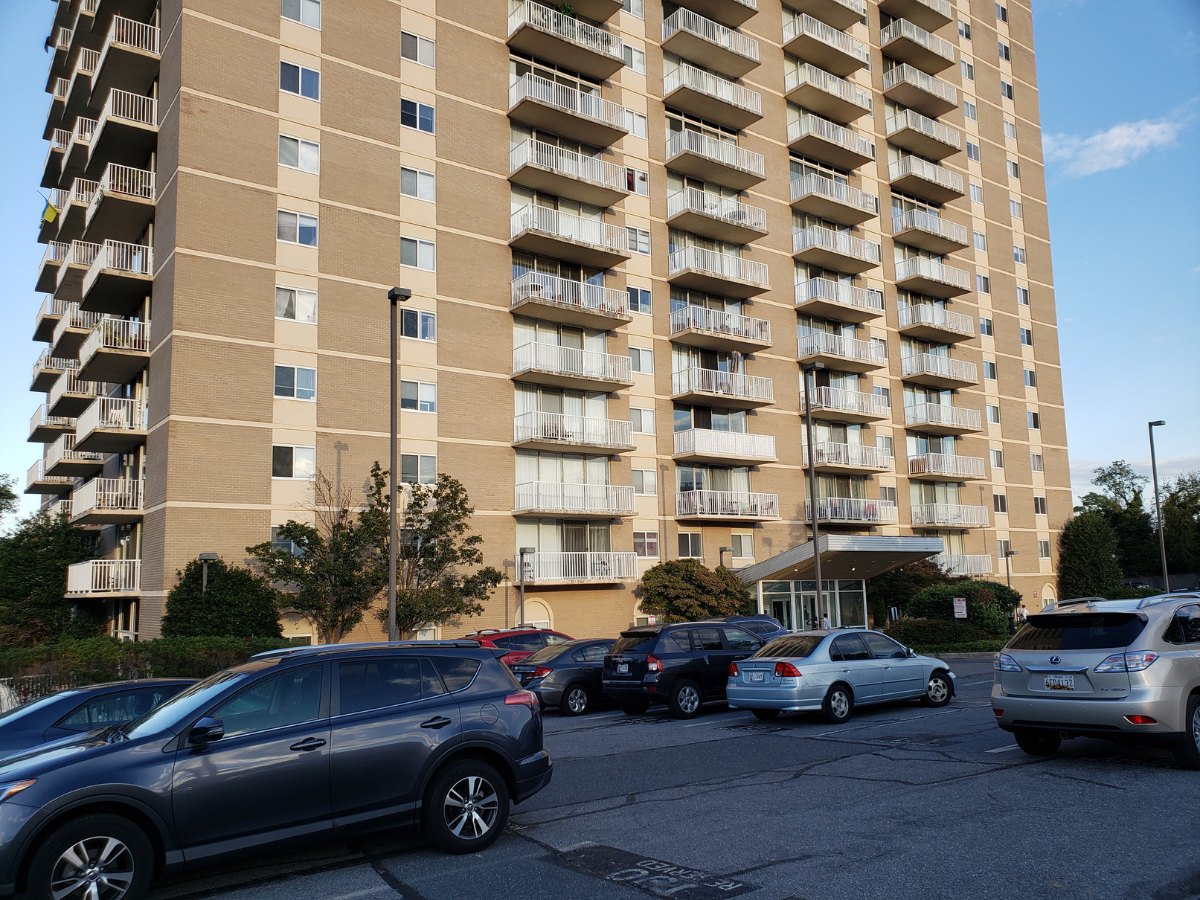The Montgomery County Housing Opportunities Commission and a nonprofit coalition dedicated to preserving the site of an African American cemetery in Bethesda faced off Thursday in Maryland’s second-highest court over a longstanding legal dispute involving the property.
At issue is the parking lot of Westwood Tower Apartments at 5401 Westbard Ave. In the 1960s, the Moses Macedonia African Cemetery was paved over to create the parking lot while the apartment complex was under construction.
The Bethesda African Cemetery Coalition has argued for six years that remains are still buried at the site. In July of last year, the county’s Housing Opportunities Commission (HOC) approved a letter of intent for the $51 million sale of the Westwood Tower Apartments to Charger Ventures LLC – a Bethesda-based investment management company. The transaction was supposed to close at the beginning of September 2021.
A month later, the coalition sued the HOC, citing state law requiring that anyone selling a cemetery property needs to first obtain a court judgment allowing the sale of the property.
That law was at the heart of arguments delivered Thursday to a three-judge panel of the Court of Special Appeals in Annapolis in a courtroom packed with observers, many of whom backed the coalition. Judges Kevin Arthur, Stuart Berger and James Kenney heard the appeal brought by the HOC.
The HOC was appealing an injunction granted in the fall of 2021 by Montgomery County Circuit Court Judge Karla Smith to block the commission’s sale of the Westwood property to Charger Ventures. The HOC filed an appeal to the injunction in November, pushing the case to the Court of Special Appeals.
The legal arguments presented by both sides cited case law from prior cases in Maryland appellate courts and the U.S. Supreme Court. Frederick Douglas — an attorney for the HOC — argued that the state law requiring a court judgment did not apply because of the way it is drafted. The particular law mentions that the property owner “may” obtain a court judgement, meaning it is not mandatory, Douglas argued.
Douglas further argued that Smith made an “erroneous finding” in stating that the cemetery coalition did not have any legal remedy if the HOC decided to sell the property without the court judgment. That’s because any development proposed for the parking lot must be reviewed and approved by county planners and the Planning Board, and would be subject to county regulations, he said.
“At the planning commission hearings, persons who object to the plan … have an opportunity to speak and to voice their concerns,” Douglas said, later adding: “Any person can come and make a presentation there, and that’s what’s important here.”
But Steven Lieberman, an attorney representing the cemetery coalition, argued that common law in Maryland, along with prior decisions by state appellate courts and the U.S. Supreme Court, protect the rights of those buried on former cemetery grounds.
Lieberman cited an 1829 Supreme Court decision, Beatty v. Kurtz. In that case, Charles Beatty and George Frazier Hawkins attempted to build more lucrative buildings at the site of an old Lutheran church in Georgetown, according to court filings and summaries of the case. Local Lutherans filed an injunction and the case eventually landed in the nation’s highest court.
In the decision, the Supreme Court ruled, in part: “The property consecrated to their use by a perpetual servitude or easement, is to be taken from them; the sepulchres of the dead are to be violated; the feelings of religion, and the sentiment of natural affection of the kindred and friends of the deceased are to be wounded; and the memorials erected by piety or love, to the memory of the good, are to be removed so as to leave no trace of the last home of their ancestry to those who may visit the spot in future generations. It cannot be that such acts are to be redressed by the ordinary process of law. The remedy must be sought, if at all, in the protecting power of a court of chancery.” Lieberman quoted from this part of the decision in his argument.
This case — with its powerful and concrete language — is one example of how the U.S. Supreme Court has recognized for centuries that the land where bodies are buried is sacred and hallowed ground, Lieberman told the court.
If the court finds that the state statute concerning a court judgment is optional, then that decision would also be inconsistent with common law, he added.
“We all know that scattered throughout Maryland and the United States, there are many burial grounds that are in states of disrepair … . This [Maryland] statute in the wisdom of the Maryland legislature was to provide a degree of protection, and there is a degree of protection where there is a sale [of property],” Lieberman said.
The court is expected to issue a decision in the coming months.



